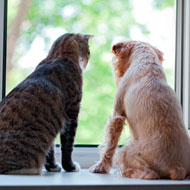
Count reveals they have more neurons in their brains
A study by researchers in Nashville, Tennessee has revealed new insights into whether dogs or cats are more intelligent.
Published in the journal Frontiers in Neuroanatomy, the study found that dogs possess significantly more neurons in their cerebral cortex than cats.
The research was led by Vanderbilt University and is the first of its kind to count the number of cortical neurons in the brains of carnivores.
“In this study, we were interested in comparing different species of carnivorans to see how the numbers of neurons in their brains relate to the size of their brains, including a few favourite species including cats and dogs, lions and brown bears,” said Associate Professor of Psychology and Biological Sciences Suzana Herculano-Houzel.
The study found that dogs have about 530 million cortical neurons whilst cats have around 250 million. Herculano-Houzel believes that the absolute number an animal has determines the richness of their mental state and their ability to predict what is about to happen in their environment.
“I’m 100 percent a dog person,” she added, “but, with that disclaimer, our findings mean to me that dogs have the biological capability of doing much more complex and flexible things with their lives than cats can. At the least, we now have some biology that people can factor into their discussions about who’s smarter, cats or dogs.”
The researchers say they picked carnivores to study because of their diversity and large range of brain sizes. They analysed one or two specimens from each of eight carnivore species: ferret, mongoose, racoon, dog, cat, lion, hyena and brown bear.
They hypothesised that the brains of carnivores should have more cortical neurones than the herbivores they prey upon. This is because hunting is more demanding on the brain compared to the herbivore’s primary strategy of finding safety in numbers.
But the team found that the ratio of neurons to brain size in small- and medium-sized carnivores was in fact the same as that of herbivores. This suggests that there is just as much evolutionary pressure on the herbivores to develop the brain power to escape from predators as there is on carnivores to catch them.
“Meat eating is largely considered a problem-solver in terms of energy, but, in retrospect, it is clear that carnivory must impose a delicate balance between how much brain and body a species can afford,” said Herculano-Houzel.



 The Veterinary Medicines Directorate (VMD) is inviting applications from veterinary students to attend a one-week extramural studies (EMS) placement in July 2026.
The Veterinary Medicines Directorate (VMD) is inviting applications from veterinary students to attend a one-week extramural studies (EMS) placement in July 2026.